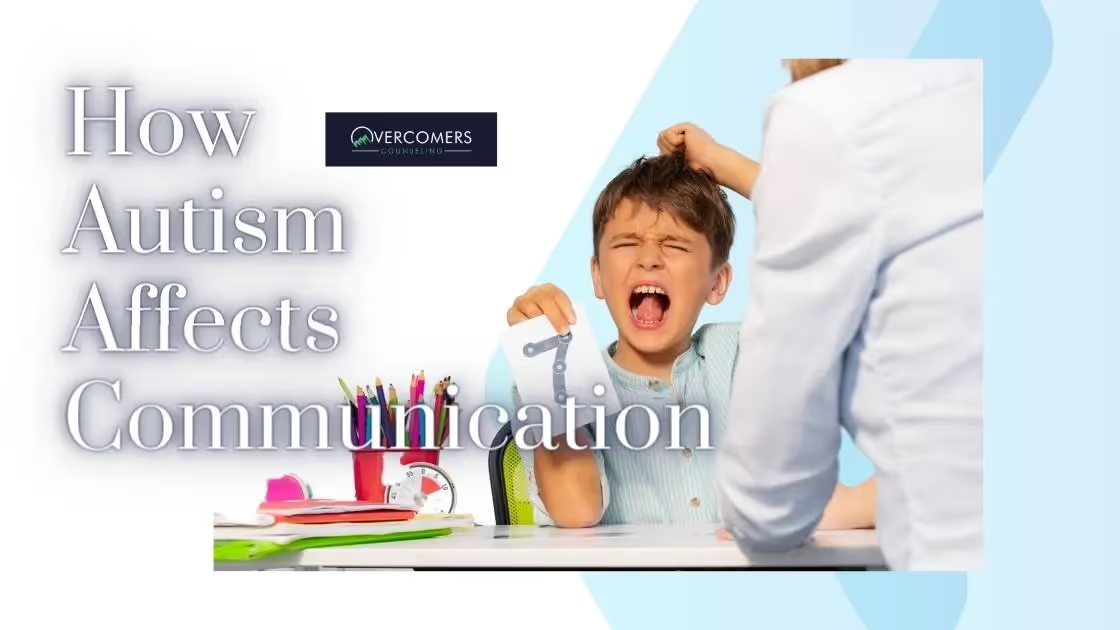With 1 in 68 children diagnosed with autism, it's important to know how to best communicate with your child.First and foremost, it's crucial to understand...

With 1 in 68 children diagnosed with autism, it's important to know how to best communicate with your child.First and foremost, it's crucial to understand what Autism Spectrum Disorder or ASD is. Autism has a variety of symptoms that are unique for every individual with the condition. Some of the signs of autism are difficulty communicating, social awkwardness, repetitive behaviors, and trouble understanding other people's feelings.It's important to educate yourself about the disorder so you can provide your child with the support they need when they go out into the world. Here are some ways in which autism affects communication.
The first step to supporting your child is understanding what Autism Spectrum Disorder is. ASD is a mental disorder that affects how a person behaves and interacts with the world. There are many ways someone can be affected by the disorder. Some of these symptoms include difficulty communicating, social awkwardness, repetitive behaviors, and trouble understanding other people's feelings. If you have a child who has been diagnosed with ASD, it's important to understand this so you can provide them with the support they need when out in the world.
The first step is identifying what type of communication your child prefers. Some kids will prefer speech, while others will prefer sign language or pointing at pictures. The most important thing is that you find a form of communication that your child enjoys and is successful with.Secondly, start by talking about things your child knows, rather than trying to have a conversation from scratch. For example, if you're looking for something in the grocery store, point out things you know they like and ask if they want them too.
This will help create a dialogue between the two of you while also getting some needs met in the process.Another helpful tip involves using social stories to explain unfamiliar situations before they happen. A social story is a short story that explains what's going to happen so your child doesn't have any surprises when they get there. You can provide an example of how people will react in this situation or what you'll be doing next. This way it's not as overwhelming for them because they know what to expect ahead of time.

Social awkwardness is one of the signs of autism. This can be difficult for kids to understand, especially if they're struggling with communication. If your child has social awkwardness, it's important to help them learn how to interact with other people in a way that's appropriate.One way to do this is by practicing good social skills through role-playing.Encourage your child to practice different ways of introducing themselves to others and different ways of saying goodbye so they won't feel nervous when meeting new people or leaving their friends. You can also play games like "Fossil Hunter" or "I Spy" that encourage your child to use their communication skills even outside of the game.
Repetitive behaviors are another sign of autism. If you notice your child is repeating words, songs, games, or actions, it could be a sign that they have ASD. One way to help break the repetitive pattern is by teaching them new words or songs.You can also teach your child how to express emotions in different ways so they don't rely on one type of expression over and over again. In addition to repetition, you might notice your child has trouble with social skills or understanding others' feelings. The best thing you can do if this is the case is to teach them how to read facial expressions and tone of voice. It's important for children with autism to learn about other people's feelings as it will help them better understand what other people are going through, which will make it easier for them when they're communicating with others later in life.
Trouble understanding other people's feelings is one of the many signs of autism. You can help your child be successful in everyday communication by teaching them about communication theory. Communication theory explains that communication success relies on how successfully both people understand each other.One way you can teach your child to better understand other people's feelings is by using age-appropriate stories to illustrate how people react differently in different situations. For example, if you want to teach your child about empathy, you could read a story about a lost toy and then talk about how the character felt at different points in the story. You could then ask your child what they think the person who lost their toy might have been feeling and talk about why they might have felt that way.
Autism is a disorder that affects a person's ability to communicate and interact with other people.It's a lifelong condition and there is no cure.For a child with autism, a person could say something and the child may not understand what they mean. Difficulties in communication can result in a lot of frustration for those with autism and their families.You can develop strategies to help your child understand what you are saying and strengthen their communication skills.It's also important to teach your child about autism so they can better understand their own condition. This will help them to have better self-esteem and understand their strengths and weaknesses.
No, we provide counseling (talk therapy) and medication management for individuals with Autism or those who may have Autism. However, if you require a formal evaluation involving comprehensive testing, we recommend consulting a Psychologist.